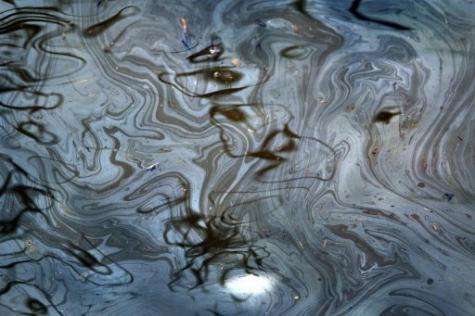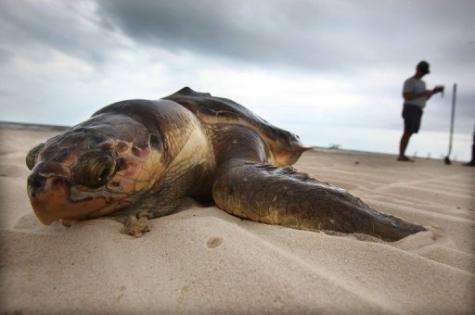A year after BP spill, US vows to restore Gulf

Residents bowed their heads at a sunrise vigil Wednesday to mark the anniversary of the massive blowout on BP's Deepwater Horizon rig, which unleashed the biggest maritime oil spill in history and blackened beaches from Texas to Florida.
President Barack Obama vowed to do "whatever is necessary" to restore the US Gulf Coast and to "hold BP and other responsible parties fully accountable for the damage they've done and the painful losses that they've caused."
Oil-coated dolphin carcasses and sticky tar balls continue to wash up on beaches a year after the April 20, 2010 explosion which killed 11 workers and sank the Deepwater Horizon some 50 miles (80 kilometers) off the coast of Louisiana.
By the time the well was capped 87 days later, 4.9 million barrels (206 million gallons) of oil had gushed out of the runaway well 5,000 feet below the surface of the Gulf of Mexico.
Hundreds of miles of fragile coastal wetlands and beaches were contaminated, a third of the Gulf's rich US waters were closed to fishing, and the economic costs since have reached into the tens of billions.
Months of uncertainty caused deep emotional trauma for the fishermen and coastal residents who feared their way of life was being destroyed. More than 120,000 people are waiting on compensation claims inching through a clogged system.
"I was very happy, and to have it ripped away from you, it's like a part of your heart is dead," said shrimper Dee Poche of Lafitte, Louisiana.
The immediate environmental damage appears to be surprisingly limited -- thanks in large part to favorable winds and tides which kept the bulk of the oil from reaching the coast -- but scientists warn it's far too soon to predict what the full impact will be.
"While we've made significant progress, the job isn't done," Obama said in a statement.
Nearly 2,000 workers remain engaged in the recovery effort -- down from a peak of more than 48,000 at the height of the spill -- and the goal is to "ensure that the Gulf Coast recovers stronger than before," Obama said.
The administration has also implemented "aggressive new reforms for offshore oil production in the Gulf so that we can safely and responsibly expand development of our own energy resources," he added.

The spill exposed the industry's shocking lack of preparedness, weak safety culture and dangerously lax government oversight.
"This disaster was almost the inevitable result of years of industry and government complacency and lack of attention to safety," a presidential commission tasked with investigating the spill concluded.
"As drilling pushes into ever deeper and riskier waters where more of America's oil lies, only systemic reforms of both government and industry will prevent a similar, future disaster," co-chair William Reilly said when the commission released its recommendations in January.
Congress has not implemented a single one of those recommendations, although the Interior Department has restructured its oversight and regulatory operations and drafted tough new safety rules.
Drilling activity is heating up again in Gulf waters after a controversial moratorium imposed on deepwater drilling was lifted in October and the first new deepwater drilling permit was issued on February 28.
But activists at a candle-light sunrise vigil in New Orleans said the disaster should be a catalyst for moving the country towards greater use of alternative energy sources.
"The only way to protect our communities, our waters and our air from another disaster is to break our addiction to oil and embrace a cleaner, safer energy future for America," said Sierra Club president Robin Mann.
"We must not allow the lives lost in the BP disaster to be in vain," she said. "Recovery on the Gulf, the health of our economy, and the safety of all Americans depends on action now."
New Orleans resident John Koeferl expressed concern that with the state's dependence on revenues from the oil industry, everyone is too eager to get back to drilling without fully assessing the risks.
"I think many people state-wide just support getting back to drilling and really aren't too interested in environmental controls," he told AFP.
"What has been exposed by all of this is how the oil companies have molded public opinion."
The spill was almost 20 times bigger than the one caused by the 1989 Exxon Valdez tanker disaster and is surpassed only by a 1910 gusher in California and deliberate releases by Iraqi troops during the 1991 Gulf War.
BP took a $40.9 billion loss in 2010 related to the spill, including $13.6 billion for the initial response, and hopes to recover a significant portion of the cost from its well ownership partners and from subcontractors Transocean, which ran the drilling rig, and Halliburton, which was responsible for the well's flawed cement job.
It has set up a $20 billion trust fund to cover compensation claims from fishermen and others affected by the spill, but also faces massive fines and penalties from the US government and will be responsible for repairing the environmental damage.
(c) 2011 AFP

















